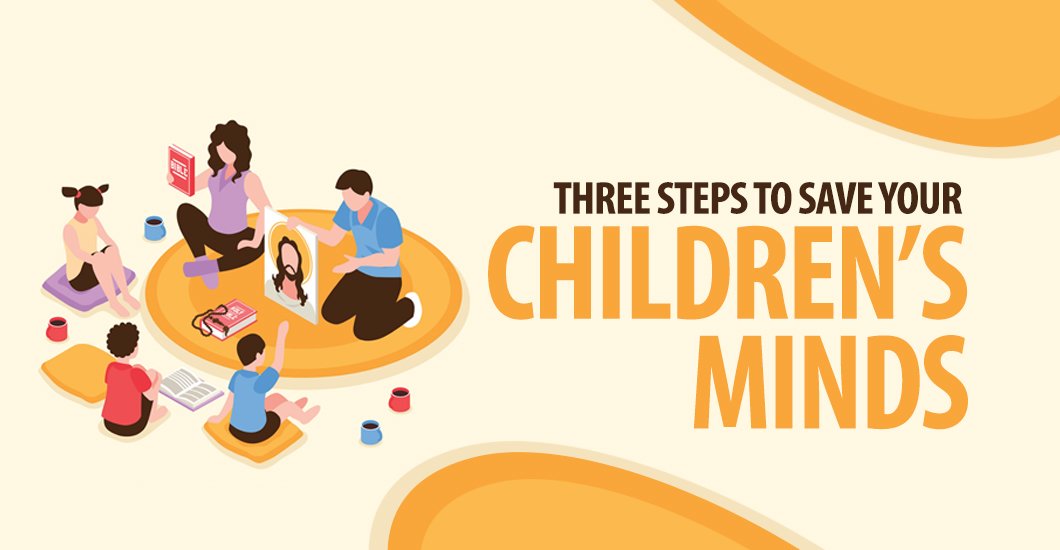Trending Articles
Three Steps To Save Our Children’s Minds
We all want to help our children go to Heaven. In seeking this, we all know that our children need to learn the basics of the Catholic faith. Therefore, we teach them; at home, in Sunday School, etc. It does not take a genius to figure out these details. Yet, if we all know the importance of a religious education, why is it that so many children still fade away from the Church? Yes, many of them come back eventually, but that does not make it acceptable to fall away in the first place. Just because people survive plane crashes, does not make me want to be in one.
I would like to present the idea that the child’s mind is not a neutral object that we can “pour” Catholic doctrine into, and expect them to behave rightly as a result. Taking them to weekly Mass and a religious education class are good, but not the sum total of a parent’s responsibility. We need to “fertilize the soil” of the child’s mind in order for the seeds of God’s truth to survive in that soil and take root. Parents need to be working actively to help their children’s minds be spiritually healthy, or all the Sunday School classes on the planet will not be enough to keep them in the faith.
Here are three simple steps to help save your children’s minds:
1. Reduce their time in front of a video screen (in some cases, drastically reduce it); generally, the more video they see, the less they will be interested in the truth of God.
2. Give them activities that strengthen and stimulate the mind (rather than those that turn it to mush); if you reduce their video time but do not stimulate them with something good in return, their minds will stagnate. The mind is like a muscle; it needs to exercise.
3. Assert your loving authority as a parent (so that they understand you really want what is best for them); if you are wimpy in your leadership, the children will not take you seriously.
In the ideal world, parents should begin doing all this before their children turn three years old. I know for many of you reading this, however, your children are already older than three. That does not mean that the work is useless, or that success is impossible, it merely means that you have to put more effort into accomplishing this. Depending on the children’s age, you will need to explain to them the need for some changes in their lives (i.e. point three above), and do so in a manner in which they genuinely understand that you are not doing this merely to maintain control over their lives, but to save them from a lifetime of pain.
I know that these three steps run counter to much of what parents are being told today. Someone said to me recently that, “unless you entertain children, they won’t listen to you in religious education classes.” She then proceeded to ask, “What can we do that will entertain them better, because they still are not listening?” That is the wrong question. The assumption that we have to respond to these children’s problems (an obsessive need for entertainment) by making concessions to them (and giving them more entertainment), is wrong from beginning to end. All we are doing with this response is enabling them to avoid overcoming their problems. We cripple their minds, and do not help them to learn how to think. We need to ask, “How can we help them to reject the self-absorbed demand for entertainment?” What would that look like if we actually carried it out? Maybe some parents would take away their children’s cell phones (!). Maybe some parents would throw their television sets in the trash. I certainly am not advocating a radical and sudden change in the home that will only alienate the children. What I am advocating, however, is that parents (especially fathers) need to discipline their children and teach them what it means to “love God with all our heart, soul, mind and body.” They need to educate them, and get them to the point where the children see the need for change. This is not done overnight, but it must start sooner rather than later.
I found it difficult to answer the earlier question about “better entertainment” in the religious education class because my children do not need to be entertained in order for them to pay attention. In fact, they appreciate learning about God without any desire for “a new and entertaining methodology” to keep their attention. No, they are not perfect; we have just avoided letting them become obsessed with having a constant barrage of entertainment.
Yes, there will be children who resist this. In my experience, however, I have found that children will generally follow through with changes for the better if the parents explain things all along the way, and make it clear that they are doing this for the good of the family (and also show that they themselves are willing to sacrifice for the sake of the children). In general, it is the parents who resist the changes far more than it is the children. Parents will say, “That’s too hard,” or “They won’t listen to me,” or “They’ll never let me do that.” We are not talking about choosing a different brand of socks, we are talking about their eternal souls; we cannot afford to find excuses.
In a mindless culture, children need to learn how to use their minds, and this goes beyond a class in logic (though, please be aware, that logic is incredibly useful). It means that we need to work, intentionally and purposefully, to help our children to think like Christians. We cannot merely throw a couple of Bible stories at them and hope that they will make the right choices when they grow up. Parents have done this, and it fails every time. This is treating the child more like a puppy than like a human. They have minds, and those minds can be cultivated and made fertile ground for the truth of God. Parents, begin the work today.
Father Chori Jonathin Seraiah is priest of the Ordinariate of the Chair of St. Peter. He serves as pastor of St. George Catholic Church in Republic, Missouri; an Ordinariate community. After serving for many years as an Anglican priest, he and his wife and five children converted and became Catholic. He was then given special permission to be ordained as a Catholic priest by Pope Benedict XVI. He blogs regularly at bewareyondragons.blogspot.com.
Related Articles
A familiar picture, a routine job, but that day, something different caught her eye. On the corner of my bathroom vanity is an old photocopy of a drawing (original source long forgotten) in a clear, plastic frame. Years ago, one of my now adult sons had carefully framed it and set it on his dresser. It sat there until he grew up. When I re-homed, I transferred it to the corner of my bathroom vanity. On Saturdays, when I clean the bathrooms, I always lift the little frame and wipe the surfaces beneath it. Occasionally, I’ll swipe my cloth over the smooth sides of the frame to wash away any settled dust and invisible germs. But, like so many other familiar things, I rarely take notice of the image inside the old childish frame. One particular day, though, this picture caught me by surprise. I eagerly focused on the eyes of the two figures in the image—a child and Jesus. The expression on the little child’s face was one of loving adoration. The innocence of child-like wonder and unrestrained admiration resonated in his soft, penciled eyes. The child’s tender, upward gaze seemed not to notice the horror of the crown of thorns atop Christ’s head or the Cross crushing His right shoulder. In contrast, Jesus’s eyes peered down from beneath heavy lids and shadowed creases. The artist had managed to skilfully veil the depth of pain behind those eyes. Drawing Parallels I recalled a memory from my early years as a mother. I was big with baby number three. In the last days of pregnancy, I was attempting to soothe my aching body with a warm bath. I bounded my two young sons. They were full of energy and chatter as they moved around the tub and peppered me with questions. My privacy and physical discomfort were of no consequence to their boyish minds. I remembered the tears that rolled down my face as I tried, in vain, to get my sons to understand that I was hurting and in need of some space. But, they were simply little children who saw me as their ever-present mama, the one who kissed away boo-boos and always stood at the ready to hear their stories and meet their needs. They lacked understanding of the physical sacrifices that child-bearing demands. And I was too familiar to be seen by them as someone other than their strong, steadfast mother. I considered the parallels. Like my little boys, the pictured child saw Our Lord through his individual, human lens of experiences. He saw a loving Teacher, a faithful Friend, and a steadfast Guide. Christ obscured the intensity of His Passion—out of mercy and met the child’s gaze with tenderness and compassion. The Lord knew that the child was not ready to see the full measure of the suffering that his salvation had cost. Lost in the Darkness Our familiarity with things, people, and situations can make us blind to reality. We most often see through the clouded tunnel of old experiences and expectations. With so many stimuli competing for our attention, it is reasonable that we filter out the world around us. But, like the child in the picture and my own little ones, we tend to see what we want to see and ignore that which does not correspond with our perspectives. I believe that Jesus wants to heal our blindness. Like the blind man in the Bible who, on being touched by Jesus, said: “I see men, but they look like trees, walking” (Mark 8:22-26), most of us are not ready to see the ordinary with divine eyes immediately. Our eyes are still too accustomed to the darkness of sin, too attached to our self-reliance, too complacent in our worship, and too proud of our human endeavors. The Full Picture The price paid for our salvation on Calvary was not an easy price. It was sacrificial. Yet, like the child in the picture on my bathroom vanity, we focus only on Jesus’s tenderness and mercy. And because He is merciful, Jesus doesn’t rush; He allows us to come to a gradual maturity of faith. However, it is good to ask ourselves every once in a while if we sincerely render efforts towards spiritual maturity. Christ did not give His life so that we might remain in the fantasy world of continued blessings. He gave His life so that we might have eternal life, and we need to open our eyes to see that He bought it at the price of His blood. As we journey through Lent and especially Holy Week, we need to allow Christ to open our eyes little by little, surrender ourselves to His will, allow Him to remove our idols one by one, and strip away that which has become familiar in our lives so that we may begin to see the old blessings of worship, family, and holiness with new eyes of deep, abiding faith.
By: Tara K. E. Brelinsky
MoreCaught in a spiral of drugs and sex work, I was losing myself, until this happened. It was night. I was in the brothel, dressed ready for “work.” There was a gentle knock at the door, not the big bang by the police, but a truly gentle tap. The brothel lady—the Madame—opened the door, and my mother walked in. I felt ashamed. I was dressed for this “work” that I had been doing for months now, and there in the room was my mom! She just sat there and told me: “Sweetheart, please come home.” She showed me love. She didn't judge me. She just asked me to come back. I was overwhelmed by grace at that moment. I should have gone home then, but the drugs would not let me. I sincerely felt ashamed. She wrote her phone number down on a piece of paper, slid it across, and told me: “I love you. You can call me anytime, and I'll come.” The next morning, I told a friend of mine that I wanted to get off heroin. I was scared. At 24, I was tired of life, and it felt like I'd lived enough to be done with life. . My friend knew a doctor who treated drug addicts, and I got an appointment in three days. I called my mom, told her I was going to the doctor, and that I wanted to get off heroin. She was crying on the phone. She jumped in the car and came straight to me. She'd been waiting… How it all began Our family shifted to Brisbane when my father got a job at Expo 88. I was 12. I was enrolled at an elite private girls’ school, but I just didn’t fit in. I dreamed of going to Hollywood and making movies, so I needed to attend a school that specializes in Film and TV. I found a school renowned for Film and TV, and my parents easily gave in to my request to change schools. What I didn't tell them was that the school was also in the newspapers because they were infamous for gangs and drugs. The school gave me so many creative friends, and I excelled in school. I topped a lot of my classes and won awards for Film, TV, and Drama. I had the grades to get to University. Two weeks before the end of grade 12, someone offered me marijuana. I said yes. At the end of school, we all went away, and again I tried other drugs... From the kid who was laser-focused on finishing school, I went on a downward spiral. I still got into University, but in the second year, I ended up in a relationship with a guy who was a heroin addict. I remember all of my friends at the time telling me: “You're going to end up a junkie, a heroin addict.” I, on the other hand, thought I was going to be his savior. But all the sex, drugs, and rock and roll ended up getting me pregnant. We went to the doctor, my partner still high on heroin. The doctor looked at us and immediately advised me to get a termination—she must have felt that with us, this child had no hope. Three days later, I had an abortion. I felt guilty, ashamed, and alone. I would watch my partner take heroin, get numb, and be unaffected. I begged him for some heroin, but he was all: “I love you, I'm not giving you heroin.” One day, he needed money, and I managed to bargain some heroin in return. It was a tiny bit, and it made me sick, but it also made me feel nothing. I kept on using, the dose getting higher and higher each time. I eventually dropped out of University and became a frequent user. I had no idea how I was going to pay for almost a hundred dollars’ worth of heroin I was using on a daily basis. We started growing marijuana in the house; we would sell it and use the money to buy even more drugs. We sold everything we owned, got kicked out of my apartment, and then, slowly, I started stealing from my family and friends. I didn't even feel ashamed. Soon, I started stealing from work. I thought they didn’t know, but I eventually got kicked out of there too. Finally, the only thing that I had left was my body. That first night I had sex with strangers, I wanted to scrub myself clean. But I couldn't! You can't scrub yourself clean to the inside out...But that didn’t stop me from going back. From making $300 a night and spending all of it on heroin for my partner and me, I went to make a thousand dollars a night; every cent I made went into buying more drugs. It was in the middle of this downward spiral that my mother walked in and saved me with her love and mercy. But that wasn’t enough. A Hole in My Soul The doctor asked me about my drug history. As I went over the long story, my mum kept on crying—she was shocked by the fullness of my story. The doctor told me that I needed rehab. I asked: “Don't drug addicts go to rehab?” He was surprised: “You don't think you are one?” Then, he looked me in the eye and said: “I don't think drugs are your problem. Your problem is, you have a hole in your soul that only Jesus can fill.” I purposefully chose a rehab that I was sure to be non-Christian. I was sick, starting to slowly detox when, one day after dinner, they called us all out for a prayer meeting. I was angry, so I sat in the corner and tried to block them out—their music, their singing, and their Jesus everything. On Sunday, they took us to church. I stood outside and smoked cigarettes. I was angry, hurt, and lonely. Begin Anew On the sixth Sunday, August 15, it was pouring rain—a conspiracy from Heaven, in hindsight. I had no choice but to go inside the building. I stayed at the back, thinking that God couldn't see me there. I had started to become aware that some of my life choices would be considered sins, so there I sat, at the back. At the end however, the priest said: “Is there anyone in here who would like to give their heart to Jesus today?” I remember standing in front and listening to the priest say: “Do you want to give your heart to Jesus? He can give you forgiveness for your past, a brand new life today, and hope for your future.” By that stage, I was clean, off heroin for almost six weeks. But what I didn't realize was that there was much difference between being clean and being free. I repeated the Salvation prayer with the priest, a prayer I didn’t even understand, but there, I gave my heart to Jesus. That day, I began a transformation journey. I got to begin anew, receive the fullness of the love, grace, and goodness of a God who had known me my whole life and saved me from myself. The way forward was not one without mistakes. I got into a relationship in rehab, and I got pregnant again. But instead of thinking of it as a punishment for a bad choice that I had made, we decided to settle down. My partner said to me: “Let's get married and do our best to do it His way now.” Grace was born a year later, through her, I have experienced so much grace. I've always had the passion to tell stories; God gave me a story that has helped to transform lives. He has since used me in so many ways to share my story—in words, in writing, and in giving my all to work for and with the women who are stuck in a similar life that I used to lead. Today, I am a woman changed by grace. I was met by the love of Heaven, and now I want to live life in a way that allows me to partner with the purposes of Heaven.
By: Bronwen Healy
MoreEcstatic over the good news of a much-awaited pregnancy, their world turned upside down during the 12th-week routine ultrasound. Our first-born Mary Grace was growing up to be a beautiful child. Our family and friends had been actively praying for us to have another baby, so we were overjoyed to learn about the pregnancy! The genetic testing returned normal results, and we decided to keep the gender a lovely surprise. When I went for the routine 12th-week ultrasound, the technician showed me the side profile of the baby and then quickly turned the screen away from me. They took my daughter out, and I immediately knew something was wrong. I thought: “Maybe the baby has some sort of heart problem or defect, but it is alright. God can fix anything, and we can have surgery.” But being a doctor, I prayed: “Please God, don’t let it be anencephaly.” Since I had had a glimpse of the ultrasound, I felt confident it would be something else. As the doctor came into the room, I asked: “Please tell me the baby is alive.” With a solemn face, she said: “Yes, the baby does have a heartbeat, but it doesn’t look good.” I started crying and called my husband on Facetime. It was what I feared the most—our baby has anencephaly, one of the severe defects a baby can have in utero where the skull does not develop appropriately—and the doctor told me the fetus wouldn’t live long. It was heartbreaking. This precious child that we had been waiting for so many years was not going to live! I thought about how excited my older daughter was. In our daily family prayer, she used to say: “Jesus, please let me have a baby brother or sister.” I kept saying in my mind: “Lord, you can heal, you can heal the baby.” My husband immediately came down. Trying hard to keep a straight face, I told my daughter that I was crying tears of joy. What else could I say? The doctor said we could terminate the pregnancy. I said, “Absolutely no way. I am going to carry the baby until he/she lives. If it’s going to be 40 weeks, it’s 40 weeks.” She did warn me that I would likely not make it that long, and in case the baby dies in the womb, there was the possibility of me getting a severe blood infection. I also needed frequent checkups as fluid build-up in my uterus could be very dangerous. I told her that I was ready to face anything. Thankfully, I wasn’t pressured further, even on the following visits. They knew that I had made my decision! Destined for Hope We came home and spent time praying and crying together. I called my sister, who was an OBGYN resident. She called a lot of friends, especially in Jesus Youth, and started a Zoom Novena that very night. We just said to our daughter that the baby has “a little bit of a booboo, but it’s okay.” We didn’t tell our parents or in-laws; my sister was to get married in a month, and we didn’t want the wedding to be affected. We also had this thought that they wouldn’t handle it with the same strength we felt. The first few days, many people talked to me, helping me trust in God’s providence and believe that He doesn’t do anything that’s not good for us. I felt immense peace. I thought about Mother Mary—the joy of receiving the good news at Annunciation and the later sorrow at knowing that He was going to die. We decided, that day, to open the card from the blood tests that revealed the gender because by then, we wanted to pray for the baby with a name. We named her Evangeline Hope, meaning ‘the bearer of good news’ because, for us, she still radiated the hope of Christ’s love and mercy. Not once did we consider aborting her because she was such good news, not only for us but for all our well-wishers—a child who would evangelize the world in many ways. I joined an Anencephaly Support group, which helped me immensely in my journey. I met many people, even atheists, who deeply regretted their decision to abort their babies. I was brought in contact with ladies who sewed angel gowns from donated wedding gowns and professional photographers who volunteered to document the birth through beautiful photos. We did a gender reveal at our sister’s wedding but still didn’t tell anyone that the baby was sick. We just wanted to honor and celebrate her little life. My sister and friends also organized a beautiful baby shower (more like a celebration of life), and instead of presents, everyone wrote letters to her for us to read after the delivery. Perpetual Adorer I carried her until the 37th week. Even after a complicated delivery, including a uterine wall rupture, Evangeline was not born alive. But somehow, I remember feeling a deep sense of Heavenly peace. She was welcomed with so much love, dignity, and honor. A priest and her Godparents were waiting to meet Evangeline. There in the hospital room, we had a beautiful time of prayer, praise, and worship. We had beautiful dresses for her. We read the letters that everybody wrote to her. We wanted to treat her with more dignity and honor than a ‘normal’ child. We cried because we missed her presence, and also because of joy as she was with Jesus now. In that hospital room, we were thinking, “Wow, I can’t wait to get to Heaven. Let’s do our best to be there with all the Saints.” Two days later, we had a ‘celebration of life’ for her with everybody wearing white. The Mass was celebrated by four priests, and we had three seminarians and a beautiful choir honoring our precious baby. Evangeline was buried in the Angels section for babies in the cemetery, which we still visit often. Although she isn’t here on earth, she is very much a part of our lives. I feel closer to Jesus because I see just how much God loves me and how He chose me to bear her. I feel honored. She is a perpetual adorer for our family to bring us to sainthood in a way no other situation could ever bring us to. It was sheer grace from God and full acceptance of His will that gave us the strength to go through this. When we accept God’s will, He showers the graces that we need to go through any given situation. All we have to do is abandon ourselves to His providence. Raising Saints Every unborn child is precious; healthy or sick, they are still gifts from God. We should open our hearts to love these children made in the image of Christ, who are in my view more precious than a “normal” child. Taking care of them is like taking care of the wounded Christ. It’s an honor to have a child with disabilities or special needs because caring for them will help us reach a deeper state of sanctity than accomplishing anything else in life. If we can see these sick unborn children as gifts—pure souls—it wouldn’t even feel like a burden. You will be raising within you, a Saint who will be seated beside all the angels and Saints. Our youngest baby boy Gabriel was born last October. As we awaited him, we used to pray that even if he is diagnosed with something, we would still have the grace to receive him with open hearts and arms. Thanks be to God, it was His will that Gabriel be born a beautiful healthy baby; and an added thanks to his sister’s intercession from heaven too. All life is a precious gift, and we are not the authors of life. We must always remember that God gives, and God takes. Blessed be the name of the Lord!
By: Dr. Hima Pius
MoreAs an only child, I had this 'baby fantasy'. Every time a cousin was born, I prepared with great ado, trimming my nails and washing up well so I could touch the baby. Waiting for Christmas felt the same as I was preparing to receive baby Jesus into my heart. Once in college, during the Christmas Mass, a thought struck me: this adorable baby Jesus is soon going to mount up to Calvary and be crucified, for Lent was just a few months away. I was perturbed, but later, God gave me the conviction that life is never without the cross. Jesus suffered so He could be with us in our sufferings. I did not fully grasp the sublime meaning of suffering until my little Anna was born premature at 27 weeks of pregnancy and all the complications that followed—severe brain damage, epileptic seizures, and microcephaly. Sleepless nights and constant cries, there wasn't an easy day from then on. I had a plethora of dreams and aspirations, but with my little one needing me so much, I had to forgo all of it. One day, I was brooding over how my life had become home-bound with Anna, now about 7 years old, stretching across my lap and slowly gulping some water little by little. In my mind, there was a lot of noise, but I could distinctly hear angelic music, and the words were repeated, over and over again: “Jesus…Jesus...this is Jesus.” With her long arms and legs, and her slender body sprawling over my lap, it suddenly dawned on me—there was a striking resemblance with the Pieta, recalling how at the foot of the Cross, Jesus lay silently on His mother's lap. Tears flowed and I was brought to the reality of God's presence in my life. When pinned down with the cares and worries of life, I sometimes gasp for even the most menial tasks, but then I remember I am not alone. Every child God gives us is truly a blessing. While Anna depicts the suffering Jesus, our 5-year-old son wipes the drool from Anna's face and promptly gives her medicine. He reminds me of the child Jesus helping his father and mother with the daily chores. Our little 3-year-old daughter never tires of thanking Jesus for even the most trivial things, bringing to mind how the child Jesus grew in wisdom and love. Our one-year-old cherub, with his little cheeks, plump rounded hands and legs, resembles the sculpted baby Jesus, bringing to mind how Mama Mary nurtured and cared for the little one. As he smiles and turns in his sleep, there’s even a glimpse of baby Jesus gently sleeping. If Jesus hadn’t come down to be amongst us, would I still have the peace and joy I experience every day? If I hadn’t known His love, would I experience the beauty of seeing Jesus in my children and doing everything for them as I would for Him?
By: Reshma Thomas
MoreI was listening in disbelief to the chastising words of my home daycare provider. Her disapproving look and tone only added to the churning in my stomach. There are few things as common to the human experience as feeling the sting of rejection or criticism. It is hard to hear less than flattering words about our behavior or character at any time, but particularly difficult when the critique leveled is one that feels unfair or inaccurate. As my husband often said, “Perception is reality;” I have come to see the truth of that statement time and again. Thus accusations that wound the most deeply are ones that seemingly come out of nowhere when the judgment of our actions may or may not reflect the intentions of our heart. Some years ago I was the recipient of the actions of one who misunderstood my intentions. Awaiting Miracle At the time, I was a mother in my late 30s, who was very grateful to have two toddlers. Despite intentional, well-timed efforts to conceive, for a full year, parenthood remained merely a dream for my husband and me. Leaving the gynecologist’s office after yet another visit, I reluctantly accepted what seemed inevitable: our only option now was the use of fertility drugs. Heading toward the car, I remarked dismally, “I guess we should stop at the pharmacy on the way home to get this prescription filled.” It was then that I heard my husband say, “Let’s give God one more month.” What?? We had already given Him a year and had been married nearly two. Our courtship had been slow to bloom. The years had added up until I was now 33 and hearing the steady ticking of my “biological clock.” Now driving home, I supposed I could wait one more month to start that drug… I peered down at the white stick’s center with the now-blue line. Excitement gripped me, and I ran out of the bathroom, shouting wildly, “We’re pregnant!!” 10 days later, I stood in front of my prayer community “family” of faith and proclaimed the good news, knowing that many of these friends had joined us in praying for this baby’s existence. Swinging Pendulum Now, four years later, we had both our long-awaited baby girl, Kristen, and our gregarious one-year- old son, Timmy, and I was listening in disbelief to the chastising words of my home daycare provider, “Miss Phyllis.” Phrases like “rebellion in children needing to be squelched,” Scriptures written out in longhand outlining the consequences of the apparent error of my ways. Her disapproving look and tone added to the churning in my stomach. I wanted to defend myself, to explain how I had read one parenting book after the other and that I tried to do everything the way the “experts” suggested. I stammered about how much I loved my children and was trying with all my heart to be a good mother. Holding back the tears, I left, the children in tow. Arriving home, I put Timmy down for a nap and settled Kristen in her room with a book to thumb through, so I could have some time to process what had just happened. As was my usual response to any crisis or problem in my life, I began to pray and seek the Lord for understanding. I realized I had two choices: I could deny the words of this woman who had been a patient, loving caregiver for my children since my daughter was 13 months old. I could try to justify my actions, reassert my intentions, and begin the process of finding a new provider for my children. Or I could examine what might have caused her to react uncharacteristically and see if there was a kernel of truth in her chastisement. I chose the latter, and as I sought the Lord, I realized I had allowed the pendulum to swing too far in the direction of love and mercy toward my children. I had used their young ages to excuse their disobedience, believing that if I just loved them enough, they would eventually do what I had asked them to. Before the Fall I couldn’t pretend Phyllis’s words hadn’t hurt. They had, deeply. Whether her perception of my parenting was, in actuality true, didn’t matter. What did matter was if I was willing to humble myself and learn from this situation. As the “Good Book” says, “Pride goes before a fall,” and heaven knows, I had already fallen pretty far off the pedestal of perfect parenting that I had set for myself. I certainly couldn’t afford another fall by clinging to my pride and hurt. It was time to acknowledge that the “experts” who write the books may not be the ones to listen to exclusively. Sometimes it is the voiceof experience that deserves our attention. The next morning, I helped the kids into their car seats and drove the familiar route to Kristen and Timmy’s caregiver, Phyllis. I knew I might not agree at times with advice that might be imparted from her in the future, but I did know that it took a wise and courageous woman to risk challenging me for the good of our family. After all, the word “discipline” comes from the word “disciple,” which means “to learn.” I had been a disciple of Jesus for many years, striving to live His ideals and principles. I had grown to trust Him as I encountered His enduring love again and again in my life. I would accept this discipline now, knowing it was a reflection of His love that wanted the best for not only me but for our family. Clambering out of the car, the three of us approached the front door when I paused to read once again the wooden hand-carved sign that was perched at eye level: “As for me and my house, we will serve the Lord.” Yes, that was what Phyllis had done. Just as the Lord does for us every day, if we have ears to hear, He “disciplines those He loves.” Jesus, our Teacher, works through those willing to risk rejection for the sake of another person’s good. Surely, Phyllis was striving to follow in His footsteps. Recognizing that this faith-filled woman intended to pass on what she had learned from the Master for my benefit, I knocked on the front door. As it swung open to allow us to enter, so too, did the door of my heart.
By: Karen Eberts
MoreDoes your struggles seem endless? When desperation clutches your heart, what do you do? I was sitting in an over-sized chair wringing my hands and waiting for the Psychologist to enter the room. I wanted to get up and run. The Psychologist greeted me, asked a few basic questions, and then the counseling session began. He held a tablet and pen. Every time I said something or made a hand gesture, he jotted notes on the tablet. After a short time, I knew from the bottom of my heart that he would determine I was beyond help. The session ended with the suggestion that I take tranquilizers to help me cope with the mess of my life. I told him I would think about it; but instinctively I knew that was not a solution. Desperate and Lonely At the receptionist desk to schedule another appointment, I rambled on and on to the receptionist about the mess of my life. She had a kind listening ear and asked if I had ever considered going to an Al-Anon meeting. She explained that Al-Anon was for family members whose lives are being affected by someone's alcoholism. She handed me a name and phone number and told me that this Al-Anon lady would bring me to a meeting. In my car, with tears rolling down my cheeks, I stared at the name and phone number. Having gotten no relief from the psychologist, and with my life in a mess, I was desperate to try anything. I also concluded that the psychologist had already diagnosed me as beyond the help of anything but pills. So, I called the Al-Anon lady. That is the moment God entered the mess of my life, and my journey of recovery began. I would like to say it was smooth sailing after beginning recovery in the Al-Anon 12-step program, but there were steep mountains and dark, lonely valleys to traverse, though always with a ray of hope. I faithfully attended two Al-Anon meetings per week. The Al-Anon 12-step program became my lifeline. I opened up to the other members. Little by little, a ray of sunshine entered my life. I began to pray again and to trust in God. After two years of Al-Anon meetings, I knew I needed additional professional help. A kind Al-Anon friend encouraged me to enter a 30-day inpatient treatment program. Letting go Because I was angry at alcohol, I did not want to be around any of the “drunks” in this treatment program. During the intensive program, I was indeed surrounded by many alcoholics and drug addicts. It seems God knew what I needed to heal: my heart began to soften as I witnessed the personal pain of my fellow addicts and the deep pain they had caused their families. It was during this time of surrender that I also came to terms with my own alcoholism. I learned that I drank to cover my pain. I came to realize that I too had been abusing alcohol and that it would be best if I refrained from drinking altogether. During that month I let go of my anger towards my husband and placed him in God's hands. After I did that, I was able to forgive him. After my 30-day program, by the grace of God, my husband entered a treatment program for his alcoholism. Life was getting better for me and my husband and our two teenage boys. We had returned to the Catholic Church and our marriage was healing one day at a time. Heart-wrenching Pain Then life handed us an unimaginable blow that shattered our hearts into a million pieces. Our seventeen-year-old son and his friend were killed in a devastating car wreck. The accident was caused by excessive speed and drinking. We were in shock for weeks. With our son violently ripped from us, our family of four was suddenly reduced to three. My husband and I and our 15-year-old son clung to each other, to our friends and our faith. Taking it one day at a time was more than I could manage; I had to take it a minute, an hour at a time. I thought the pain would never leave us. By God's grace, we entered an extended period of counseling. The kind and caring counselor, knowing that each family member deals with the death of a loved one in their own way and in their own time, worked with each of us individually to process our grief. Months after my son's death, I was still consumed with anger and rage. It was frightening for me to realize that my emotions were so wildly out of control. I wasn't angry at God for taking my son, but at my son for his irresponsible decision the night he died. He chose to drink alcohol and to be a passenger in an automobile that was driven by someone who was also drinking. I became enraged at alcohol in any form. One day at our local supermarket, I spotted a beer display at the end of an aisle. Each time I passed the display, I felt myself rage. I wanted to demolish the display until there was nothing left of it. I rushed out of the store before my anger exploded into uncontrollable rage. I shared the story with our family counselor. He offered to take me to the shooting range where I could use his rifle to aim, shoot, and demolish as many empty beer cans as I needed to safely release the powerful anger that controlled me. Love that heals But God in His infinite wisdom had other gentler plans for me. I took a week off from work and attended a spiritual retreat. On the second day of the retreat, I participated in an inner healing meditation in which I pictured Jesus, my son, and I in a beautiful garden surrounded by colorful flowers, rich green grass, and magnificent trees filled with softly chirping blue birds. It was peaceful and serene. I was overjoyed to be in the presence of Jesus and to be able to hug my precious son. Jesus, my son, and I strolled leisurely hand in hand, silently feeling an immense love flowing between us. After the meditation, I felt profound peace. It wasn't until after I returned home from the retreat that I realized my anger and rage had evaporated. Jesus had healed me of my uncontrollable anger and replaced it with an outpouring of His grace. Instead of anger, I felt only love for my precious son. I was grateful for the love, joy, and happiness my son had given me throughout his much too short life. My heavy burden was becoming lighter. When tragic death strikes a family, every member can be overcome with grief. Processing the loss is challenging, requiring us walk through dark valleys. But God's love and His amazing grace can bring rays of sunshine and hope back into our lives. Grief, saturated by God's love changes us from the inside out, transforming us little by little into people of love and compassion. Unfailing Hope Through many years of dealing with the effects of addiction and the craziness that brings, coupled with grieving the death my son, I have clung to Jesus Christ, my rock, and my salvation. Our marriage suffered tremendously after the death of our son. But by the grace of God and our willingness to seek help, we continue, one day at a time, to love and accept each other. It takes daily surrender, trust, acceptance, prayer and clinging to the hope we have in Jesus Christ, our Savior, and our Lord. We each have a story to tell. Often it is a story of heartache, challenge, and sorrow, with a mix of joy, and hope. We are all seeking God, whether we acknowledge it or not. As Saint Augustine said: “You have made us for Yourself, O Lord, and our heart is restless until it rests in you.” In our search for God many of us have taken detours that led to dark and lonely places. Some of us have avoided the detours and sought a deeper relationship with Jesus. But no matter what you are going through currently in your life, there is hope and healing. At every moment God is seeking us. All we need do is reach out our hand and let Him take it and lead us. “When you pass through waters, I will be with you; through rivers, you shall not be swept away. When you walk through fire, you shall not be burned, nor will flames consume you. I, the Lord, am your God, the Holy One of Israel, your savior.” Isaiah 43: 2-3
By: Connie Beckman
MoreQ – My pre-teens are clamoring for a phone so they can get social media, like all of their friends. I feel so torn, because I don’t want them to be left out, but I know how dangerous it can be. What is your opinion? A: Social media can be used for good. I know a twelve-year-old who makes short Bible reflections on TikTok, and he gets hundreds of views. Another young person I know has an Instagram account dedicated to posting about the saints. Other teens I know go on Discord or other chat rooms to debate atheists or to encourage other young people in their Faith. Without a doubt, there are good uses for social media in evangelization and forming Christian community. And yet…do the benefits outweigh the risks? A good maxim in the spiritual life is: “Trust God immensely…never trust yourself!” Should we entrust a young person with unfettered access to the internet? Even if they start out with the best of intentions, are they strong enough to resist the temptations? Social media can be a cesspool—not just obvious temptations like pornography or glorifying violence, but even more insidious temptations like gender ideology, bullying, becoming addicted to the “high” of getting likes and views, and feelings of inadequacy when teens start to compare themselves with others on social media. In my opinion, the risks outweigh the benefits of allowing young people access to a secular world which will try to form them away from the mind of Christ. Recently a mother and I were discussing her teenage daughter’s poor behavior and attitude, which was correlated to her use of TikTok and her unfettered access to the internet. The mother said with a sigh of resignation, “It’s just so sad that teens are so addicted to their phones…but what can you do?” What can you do? You can be a parent! Yes, I know peer pressure is tremendous to allow your kids a phone or device with endless free access to all the worst humanity has to offer (aka social media) – but as a parent your job is to form your children to be saints. Their souls are in your hands. We must be that first line of defense against the dangersof the world. We would never allow them to spend time with apedophile; if we knew they were being bullied we would try to protect them; if something were harming their health, we would spare no expense to rush them to the doctor. Then why wouldwe allow them a window into the cesspool of porn, hatred, and time-wasting trash that’s readily available on the internet without offering careful guidance? Study after study has shown the negative effects of the internet in general—and social media in particular—but still we turn a blind eye and wonder why our teenage sons and daughters struggle with identity crises, depression, self-hatred, addictions, aberrant behavior, laziness, a lack of desire for holiness! Parents, do not abdicate your authority and your responsibility! At the end of your lives, the Lord will ask you how well you shepherded these souls He entrusted to you—whether or not you led them to Heaven and preserved their souls from sin to the best of your ability. We cannot use the excuse, “Oh, well everyone else’s kids have one, so my kid would be strange if they didn’t! Will your kids be angry with you, maybe even say they hate you, if you put restrictions on their devices? Probably. But their anger will be temporary—their gratitude will be eternal. Recently another friend who travels the country speaking about the dangers of social media told me that after her talk she always has many young adults come up to her with one of two reactions: “At the time I was furious with my parents for taking away my phone, but now I’m grateful.” OR “I really wish my parents had protected me from losing so much innocence.” No one has ever been grateful that their parents were so permissive! So, what can be done? First, do not give teens (or younger!) phones with internet or apps. There are plenty of dumb phones still in existence! If you must give them phones that access the internet, put parental restrictions on them. Install Covenant Eyes on your son’s phones—and on your home computers while you’re at it (almost every Confession I hear involves pornography, which is mortally sinful and can lead your son to view women as nothing but objects, which will have huge ramifications on his future relationships). Do not allow them to use their screens at meals or while alone in their bedrooms. Get the support of other families who have the same policies. Most importantly—do not try to be your kid’s friend, but be their parent. Authentic love requires boundaries, discipline, and sacrifice. Your kid’s eternal welfare is worth it, so do not say, “Alas, I can’t do anything—my kid needs to fit in.” It’s better to stand out here on earth so we can fit into the Communion of Saints!
By: Father Joseph Gill
MoreWhether you know it or not, when you seek truth, you seek God. One warm summer day as a boy of nine, I went for a walk with a couple of friends. One of my friends, who was a little older, brought an air rifle with him. As we walked through a cemetery, he pointed to a bird on top of the church roof and asked if I thought I could hit it. Without giving it a second thought, I took the gun, loaded, and took aim. The moment I squeezed the trigger, a cold feeling of death fell over me. Before the pellet had even left the gun, I knew I was going to hit this living creature and it would die. As I watched the bird fall to the ground, I experienced sadness and guilt, and confusion swept over me. I questioned why I had done it, but I had no answer. I had no idea why I gave my consent, but I felt empty and numb. As with many things in life, I buried the event inside and soon forgot about it. Déjà vu In my late twenties, the woman I was in a relationship with became pregnant. When we found out, we hardly confided in anybody.. I didn’t expect any support or advice anyway, and it didn’t seem that big a deal. I convinced myself I was doing the ‘decent thing’--assuring her I would support any decision she made, whether to keep the baby or have an abortion. For several reasons, we decided to end the pregnancy. What helped me arrive at the decision was the legality of abortion in this country and the great number of people who procure abortions. How could it be that bad? Ironically, raising children of my own was always the biggest dream of my life. We made the appointment with the abortion ‘clinic.’ Going there felt like a simple trip to the chemist to pick up a prescription, so much so, in fact, that I waited outside in the car, oblivious to the magnitude and impact this decision would have. When my girlfriend came out of the building, I at once saw the change in her. Her pale face projected ‘Death.’ The emotions I had felt as a nine-year-old boy shooting the bird flooded over me. We travelled home in silence, and barely spoke about it again. But we both knew something had changed us that day, something tragic, something dark. Freedom A couple of years later, I was accused of a crime I hadn’t committed and placed on remand in HMP Manchester (Strangeways Prison) to await trial. I began to speak to God in my heart and for the first time in my life I began to pray the Rosary properly. After a few days, I began reviewing my life, scene by scene, and I saw many blessings I had received, but also my many sins. When I got to the sin of abortion, for the first time in my life I realized clearly that it had been a real living baby growing in the womb, and that it was my child. The realization that I had chosen to end my own child’s life broke my heart, and while crying on my knees in that prison cell I said to myself, ‘I can’t be forgiven.’ But it was in that very moment that Jesus came to me and spoke words of forgiveness, and I knew there and then that He had died for my sins. I was instantly flooded with His love, mercy, and grace. For the first time my life made sense. I deserved death but received life from the One Who said, ‘I am the Life’ (John14:6). No matter how great our sins may be, I realized, God’s love is infinitely greater (John 3:16-17)! An Encounter Recently, sitting in a London train station waiting for my train, I silently asked Jesus to bring someone on board that I could witness to about him. When I took my seat, I found myself facing two women. After a while we began to chat and one of them asked about my faith and if I had always been a believer. I shared some of my past, including the abortion, and explained that the moment I realized I had taken the life of my own child I came face to face with the crucified Christ, and was forgiven and set free. Instantly the pleasant mood changed. I had hit a nerve and one of the women started screaming at me. I reminded her she had asked for my story, so I was only answering her question. Unfortunately, there was no reasoning with her. She screamed “It isn’t a baby in the womb!” with the other woman nodding in agreement. I sat patiently and then asked what them what makes what is in the womb “a baby.” One answered “DNA,” and the other agreed. I told them that DNA is present the moment a baby is conceived, and gender and eye colour are already decided. Again, they screamed at me to a point where one of them was shaking. After an awkward silence, I said I felt so sorry she had gotten so upset. It turned out this woman had had an abortion many years before and was clearly still carrying wounds from the experience. When she stood to get off, we shook hands, and I assured her of my prayers. Unbound The tragedy of ending an innocent life in the womb is scarcely spoken about today, and when it is, we hear much misinformation and even lies rather than the facts. Choosing to abort a child is not a one-off, done-and-dusted decision, with no lasting negative effects. The pro-choice movement insists that “it’s the mother’s body, so it’s her choice.” But there is more than the mother’s body and choice to consider. There is a tiny, miraculous life growing in the womb. As the father of an aborted baby, I can honestly say that my healing has been a process, which has been ongoing even until this day. Thanks be to God those who seek the truth can find it, if only they open their hearts. And when they come to know the ‘Truth’, the ‘truth will set them free’ (John 8:31-32).
By: Sean Booth
MoreWe slide into our pew with one minute to spare, and I have a feeling that Mass is going to be a struggle for our family. By the time the priest finishes reading the Gospel, I’m frazzled and overwhelmed. Then during the Creed—as I am stifling down the urge to shout, “We are not taking any more trips to the bathroom!”—my busy three-year old licks the pew while my seven-year old tells me he is thirsty again and asks what con-sub- stan-tial means. Going to Mass is not always easy. I feel discouraged and even ashamed for not paying better attention at Mass. How am I supposed to worship God while juggling the many demands on my attention? The answer: a heart of simplicity. I used to think the phrase “active participation at Mass” meant absorbing the deep meaning of every single word I hear. But in this season of life, having focus is a luxury. Now as I raise my children, I begin to understand that God does not hold back His invitation or His Presence just because my life gets messy. He loves me and accepts me as I am—mess and all—even amidst the chaos of a hectic Mass experience. If we remember this, you and I can take simple steps to prepare our hearts for God’s supreme gift of Love in the Eucharist. Discover a Short Phrase I am often overwhelmed by the number of words I hear at each Mass. My attention falters, and I struggle to follow many of the spoken parts. If you navigate this challenge too, know that you and I are still called to listen and be engaged at Mass. How? Simplify. Listen for a short phrase that catches your attention. Reflect on it. Repeat it. Bring it to Jesus and ask Him to show you why it is important. Hold this phrase in your heart throughout the Mass and let it become an anchor for your attention while you attend to your family responsibilities. Your open heart is a landscape for Christ’s grace. Gaze With Love Love does not always need words. Sometimes a simple glance can communicate an ocean of love. If words wash over you, engage your heart and direct your love to the Lord by focusing your eyes on a Crucifix or a Station of the Cross. Reflect on the details you see: Christ’s face, His crown of thorns, His bleeding heart. Each detail you intentionally take in draws your heart closer to Jesus and prepares you to receive Our Lord’s immense gift of Love in the Eucharist. Bring Your Heart If all else fails, bring yourself to Jesus as an offering of love. The Lord knows your intentions and your true desires. If you feel frazzled and unfocused by things beyond your control, you can still come before the Lord with a heart willing to worship Him, to receive Him and to love Him. Stir the affections of your heart and repeat “Here I am Lord. I choose you. Transform my heart!” Our Lord rejoices every time we encounter Him at Mass, regardless of our circumstances. Jesus was human—He got tired, He got interrupted. Our Lord understands the mess of life! And even in the midst of it, He wants to give Himself to you in the Eucharist. So next time you go to Mass, give Jesus your willing heart, your “yes” to come before Him as you are. Christ’s love is bigger than whatever family chaos is happening in your pew.
By: Jody Weis
MoreAn Exclusive Interview with Antonia Salzano, mother of Blessed Carlo Acutis by Graziano Marcheschi, the Contributing Editor of Shalom Tidings as she speaks from her heart of what it’s being like to be a Saint’s mom. At age seven he wrote, “My life plan is to be always close to Jesus.” By the time he was fifteen, he had gone home to the Lord whom he had loved throughout his short life. In between, is the remarkable story of a remarkably ordinary boy. Ordinary, because he was not a standout athlete, nor a handsome movie star, nor even a brilliant scholar who finished graduate school when other kids are struggling through junior-high. He was a nice kid, a good kid. Very bright, to be sure: at age nine he read college textbooks to teach himself computer programming. But he did not win awards, nor influence people on Twitter. Few outside his circle knew who he was—an only child, living with his parents in northern Italy, who went to school, played sports, enjoyed his friends, and knew how to handle a joystick. Un-remarkable but Extraordinary As a very young child he fell in love with God and from then on, he lived with a singular focus, with a hunger for God that few ever achieve. And by the time he left this world he had made an indelible mark on it. Always a boy on a mission, he wasted no time. When people could not see what he saw, even his own mother, he helped them open their eyes. Via Zoom, I interviewed his mother, Antonia Salzano, and asked her to explain his hunger for God, which even Pope Francis described as a “precocious hunger”? “This is a mystery for me,” she said. “But many saints had special relationships with God from an early age, even if their family was not religious.” Carlo’s mother speaks from her heart openly about having attended Mass only three times in her life before Carlo started dragging her there when he was three-and-a-half. The daughter of a publisher, she was influenced by artists, writers, and journalists, not popes or saints. She had no interest in matters of faith and now says she was destined to become a “goat” rather than a “sheep.” But then came this marvelous boy who “always raced ahead—he spoke his first word at three months, started talking at five months, and began writing at age four.” And in matters of faith, he was ahead even of most adults. At age three, he began asking questions his mother could not answer—lots of questions about the Sacraments, the Holy Trinity, Original Sin, the Resurrection. “This created a struggle in me,” Antonia said, “because I myself was as ignorant as a child of three.” His Polish nanny was better able to answer Carlo’s questions and spoke with him often about matters of faith. But his mother’s inability to answer his questions, she said, “diminished my authority as a parent.” Carlo wanted to engage in devotions she had never practiced—honoring the saints, putting flowers before the Blessed Virgin, spending hours in church before the cross and tabernacle.” She was at a loss about how to deal with her son’s precocious spirituality. The beginning of a Journey The unexpected death of her father from a heart attack led Antonia to start asking her own questions about life after death. Then, Father Ilio, an elderly holy priest known as the Padre Pio of Bologna, whom she met through a friend, set her on a journey of faith on which Carlo would become her primary guide. After telling her all the sins of her life before she confessed them, Father Ilio prophesied that Carlo had a special mission that would be of great importance for the Church. Eventually, she began studying Theology, but it is Carlo whom she credits with her “conversion,” calling him “her savior.” Because of Carlo, she came to recognize the miracle that occurs at each Holy Mass. “Through Carlo I understood that the bread and wine become the real presence of God among us. This was a fantastic discovery for me,” she said. His love of God and appreciation of the Eucharist was not something young Carlo kept to himself. “The specialness of Carlo was to be a witness,” she said, “...always happy, always smiling, never sad. ‘Sadness is looking in toward the self;’ Carlo would say, ‘happiness is looking out toward God.’” Carlo saw God in his classmates and everyone he met. “Because he was aware of this presence, he gave witness to this presence,” she said. Nourished daily by the Eucharist and divine Adoration, Carlo sought out the homeless, bringing them blankets and food. He defended classmates who were bullied and helped those who needed homework assistance. His one goal was “to speak about God and help others get closer to God.” Seize the day! Perhaps because he sensed his life would be short, Carlo made good use of time. “When Jesus came,” Antonia commented, “he showed us how not to waste time. Each second of his life was glorification of God.” Carlo understood this well and emphasized the importance of living in the now. “Carpe diem! (Seize the day!),” he urged, “because every minute wasted is one less minute to glorify God.” That’s why this teenager limited himself to but one hour of video games per week! The attraction that many who read about him instantly feel toward Carlo characterized his whole life. “Since he was a young boy, people were naturally attracted to him—not because he was a blue-eyed fair-haired child, but because of what was inside,” said his mother. “He had a way to connect with people that was extraordinary.” Even in school he was beloved. “The Jesuit fathers noticed this,” she said. His classmates were competitive kids from the upper classes, focused on achievement and success. “Naturally, there is lots of jealousy between classmates, but with Carlo none of that happened. He melted those things like magic; with his smile and purity of heart he conquered everyone. He had the ability to enflame the hearts of people, to turn their cold hearts warm.” “His secret was Jesus. He was so full of Jesus—daily Mass, Adoration before or after mass, devotion to the Immaculate Heart of Mary—that he lived his life with Jesus, for Jesus, and in Jesus. A Foretaste of Heaven “Carlo genuinely felt God’s presence in his life,” said his mother, “and this completely changed the way people looked at him. They understood there was something special here.” Strangers, teachers, classmates, a holy priest, all recognized something unique in this boy. And that uniqueness was most evident in his love of the Eucharist. “The more we receive the Eucharist,” he said, “the more we will become like Jesus, so that on earth we will have a foretaste of Heaven.” All his life he looked toward Heaven and the Eucharist was his “highway to Heaven... the most supernatural thing we have,” he would say. From Carlo, Antonia learned that the Eucharist is spiritual nourishment that helps increase our capacity to love God and neighbor—and grow in holiness. Carlo used to say “when we face the Sun we get a tan, but when we stand before Jesus in the Eucharist we become saints.” One of Carlo’s best known accomplishments is his website chronicling Eucharistic miracles throughout history. An exhibit developed from the website continues to travel the world from Europe to Japan, from the US to China. Besides the amazing number of visitors to the exhibit, numerous miracles have been documented, though none as significant as the many it has brought back to the Sacraments and the Eucharist. Process of Subtraction Carlo is beatified and his canonization is assured, pending the authentication of a second miracle. But Antonia is quick to point out that Carlo will not be canonized because of miracles but because of his Holy life. Holiness is determined by the witness of one’s life, by how well they lived the virtues—faith, hope, charity, prudence, justice, temperance, and fortitude. “Living the virtues heroically”—which the Catechism of the Catholic Church defines as ‘a habitual and firm disposition to do the good’—is what makes one a saint.” And that’s exactly what Carlo strove to do. He tended to talk too much, so he made an effort to talk less. If he noticed himself overindulging, he’d strive to eat less. Nightly, he examined his conscience about his treatment of friends, teachers, parents. “He understood,” his mother said, “that conversion is not a process of addition, but of subtraction.” A profound insight for one so young. And so Carlo worked even to eliminate from his life every trace of venial sin. “Not I, but God,” he would say. “There needs to be less of me so I can leave more room for God.” This effort made him aware that the greatest battle is with ourselves. One of his best known quotes asks, “What does it matter if you win a thousand battles if you cannot win against your own corrupt passions?” This effort “to overcome the defects that make us spiritually weak,” observed Antonia, “is the heart of holiness.” Young as he was, Carlo knew sanctity lies “in our efforts to resist the corrupt instincts we have inside us because of Original Sin.” A Chilling Insight Of course, losing her only child was a great cross for Antonia. But fortunately, by the time he died, she had already found her way back to her faith and had learned that “death is a passage to true life.” Despite the blow of knowing she would lose Carlo, during his time in the hospital the words that echoed inside her were those from the Book of Job: “The Lord gave and the Lord has taken away. Blessed be the name of the Lord.” (Job 1:21). After his death, Antonia discovered a video Carlo had made of himself on his computer. Though he knew nothing of his leukemia at the time, in the video he says that when his weight goes down to seventy kilos, he will die. Somehow, he knew. Yet, he is smiling and looking at the sky with his arms upraised. In the hospital, his joy and peacefulness belied a chilling insight: “Remember,” he told his mother, “I won’t leave this hospital alive, but I will give you many, many signs.” And signs he has given—a woman who prayed to Carlo at his funeral was healed of breast cancer without any chemotherapy. A 44-year-old woman who had never had a child prayed at the funeral and one month later was pregnant. Many conversions have occurred, but perhaps the most special miracle “is the one for the mother,” says Antonia. For years after Carlo’s birth Antonia had tried to conceive other children but to no avail. After his death, Carlo came to her in a dream telling her she would become a mother again. At age 44, on the fourth anniversary of his death, she gave birth to twins—Francesca and Michele. Like their brother, both attend Mass daily and pray the Rosary, and hope one day to help further their brother’s mission. When his doctors asked if he was in pain, Carlo replied that “there are people who suffer much more than me. I offer my suffering for the Lord, the Pope (Benedict XVI), and the Church.” Carlo died just three days after his diagnosis. With his last words, Carlo professed that “I die happy because I didn’t spend any minutes of my life in things God doesn’t love.” Naturally, Antonia misses her son. “I feel Carlo’s absence,” she said, “but in some ways I feel Carlo much more present than before. I feel him in a special way—spiritually. And I feel also his inspiration. I see the fruit his example is bringing to young people. This is a big consolation for me. Through Carlo, God is creating a masterpiece and this is very important, especially in these dark times when people’s faith is so weak, and God seems to be unnecessary in our lives. I think Carlo is doing a very good job.”
By: Graziano Marcheschi
MoreLatest Articles
Do you know how to handle little things that drive you nuts? The other day, I misplaced my car keys when I was in my office building, which is a huge place. It has a large first floor with many side rooms, an enormous basement, and various offices upstairs. There were so many places my keys could have been since I went up and down the stairs all day long. Saying a quick prayer, I retraced my steps, trying to remember where I laid my keys down. After walking around for a while, I suddenly remembered where I might have put them and ran upstairs to one of the offices. Sure enough, there were my car keys. Thank you, Jesus! I find that there is always a lesson lurking in the day's events—if I stop and reflect. Just as parents are alert for and use ‘teaching moments’ to educate their kids, so, too, does God use teaching moments to form us. They are often small grievances, for example, driving all the way to the store and realizing you forgot your wallet. Or worse, getting to the checkout with your cart full of groceries before you realize you don’t have your wallet. Or locking your keys in your car—and worse, seeing that you also locked your cell phone in there! Seeking Fervently… These small events can cause frustration and anger, or we can choose to see them in the light of God's training and disciplining us. If we choose the second option, we can say: “Okay, Lord. I choose to praise You and thank You because Ephesians 5:20 says: ’Giving thanks to God the Father at all times and for everything in the name of our Lord Jesus Christ.’” When we lose our keys and are searching for them, we can say: “Thank You, Lord, for this trial of inconvenience.” As fervently as I am seeking for my keys, I want to fervently be seeking You. “Your face, Lord, do I seek.” (Psalm 27:8) If we can perceive God's loving hand in allowing these things to happen so that they can help train and discipline us, then we can smile and even laugh at daily annoyances. This is something that a priest taught me. Father Jack used to call his guardian angel ‘Laughing Boy’ because of these kinds of little mishaps. If he locked himself out of the car, missed a ride, or couldn't find a paper he needed, Father Jack would say: “Laughing Boy is at it again!” And he would chuckle. Father Jack had learned and taught us an important lesson–don’t take yourself too seriously. The ability to laugh at yourself and at the little grievances of the day helps to keep a smile on your face, and then you will radiate joy to those you meet. Remember, there is always a lesson. Take time to ponder and say: “Okay, God. Here I am. What are You trying to teach me in the events of this day?” Then look at how you responded. Did you learn something and grow in virtue, or did you react badly? Don't worry if you fail. There will be more pop quizzes tomorrow.
By: Ellen Hogarty
MoreLast spring, the enthusiasm I felt about planting a vegetable garden was so great! I couldn’t wait for the right time to put those tiny plants into the dirt. When the time came, I had to decide what to plant. Last year and again this year, I decided to plant vegetables that could be used in preparing a salad. This included lettuce, tomatoes, green onions, radishes, and a variety of peppers. As my garden began giving us a variety of vegetables, my husband and I savored the taste of our fresh salads almost daily throughout the summer. I suppressed the thought of the season-ending and that the last harvest would be soon. It just wouldn’t be the same going to the grocery store and purchasing these very items that God had provided us all summer long. Instead, I decided to be grateful for His blessings. Much to my surprise and delight, the season's last tomato was heart-shaped! My mind drifted to God's love. This is certainly a gift to be shared. I took a few pictures of my gift from God and sent them to my family, simply saying: “Jesus loves you!” One dear friend told me that the tomato resembled the Sacred Heart of Jesus. She added that God can even use a tomato to tell us how much He loves us. I didn't want this beautiful and delicious tomato to spoil, so I eventually used it. As I write this story, I’m still overwhelmed by how much God loves me. Our Lord loves us in big ways, even through the smallest details of our lives, and even by using a heart-shaped tomato! He said: “The Kingdom of God is as if someone would scatter seed on the ground, and would sleep and rise night and day, and the seed would sprout and grow, he does not know how.” (Mark 4-26:27)
By: Carol Osburn
More“Those who surrender to the service of the poor through the love of Christ will live like the grain of wheat that dies,” preached Romero in his last homily. During the time when Oscar Romero was appointed as the Archbishop of San Salvador in 1977, the country was suffering from a severe economic and political crisis. With the death of his friend Father Rutilio Grande by the paramilitaries, the Archbishop became an outspoken critic of the government. The prelate, during his trips abroad, exposed the human rights abuses prevailing in the country. When the military junta seized the country, he began a radio broadcast of his sermons, openly criticizing the government for torture and mass murders. The act gained him the sobriquet, ‘The voice of those without voices.’ In a sermon on 23rd March 1980, the Archbishop implored the soldiers to stop executing government orders and, as Christians, obey God’s orders instead. The next evening, Romero celebrated Mass in a small chapel at Hospital de la Divina Providencia, a Church-run hospital specializing in oncology. After delivering the sermon, as he moved to the center of the altar, a red car stopped before the chapel, and a gunman stepped out of the vehicle, firing two shots at the Archbishop. The bullets went straight through Romero’s heart, and he breathed his last at the altar. His legacy has since inspired Catholics and non-Catholics around the world to stand against human rights abuse and fight for peace and justice. During the canonization of Archbishop Oscar Arnulfo Romero in 2018, Pope Francis wore the same blood-stained belt that Romero wore when he was killed at the altar. The Catholic Church honors this heroic life as the Patron Saint of Persecuted Christians.
By: Shalom Tidings
MoreThis is the best paradigm of master-slave dynamics the world has ever seen… In the early ‘60s, an emerging blue-rock band, The Rolling Stones, let loose a misogynistic song, Under My Thumb, that illustrates a certain social dynamic. We hear: Under my thumb The girl who once had me down Under my thumb The girl who once pushed me around … It’s down to me, yes it is The way she does just what she’s told, Down to me, the change has come She’s under my thumb, Ah, ah, say it’s alright. As offensive as these lyrics are, they contain a paradigm of the dominant consciousness of a society of how people relate to each other in the political, economic, and social domains. 19th-century German philosopher Friedrich Hegel explained this dynamic with his notion of the master-slave dialectic, which said that one’s sense of self-worth is directed towards someone who is perceived as unequal to oneself. Like The Rolling Stones, Hegel is talking about very dark social relationships in which the ego seeks to be in control, to dominate others to obtain one’s needs and to obtain privilege and status. So, the world is divided into insiders and outsiders— those at the top and those at the bottom. Or, as Bruce Springsteen once sang: “Down here, it’s just winners and losers, and Don’t get caught on the wrong side of that line” (Atlantic City from Nebraska). For those who are on the winning side, they want to keep things the way they are because the status quo works to their advantage. So, the master-slave dialectic seems to work at all levels. Along God’s Way Now, even before Hegel et al., the authors of the Old Testament were concerned about this problem because their central story was the Exodus Experience, which was a movement from oppression to liberation in which God identifies with the oppressed and resists the oppressor. God, working through Moses, brings the people out of servitude and guides them to the Promised Land—a state of justice and human flourishing. In doing so, God overcomes the master-slave dialectic, which is the central work of the God of Israel. Now, fast-forward 1200 years to Yeshua, Jesus of Nazareth, around 33 A.D., who appears in the hills of Galilee. On the lips of this young man who spoke as one having authority was the message that the Kingdom of God was at hand. That is, God’s way of ordering things is coming about, and this Kingdom is perfectly personified in Jesus. What God has in mind in how we organize ourselves radically differs from the master-slave dialectic. What does Jesus have in mind when he proclaims and lives in the Kingdom of God? The best source is the Sermon of the Mount in Matthew’s Gospel, chapters 5-7. In the Kingdom, we wouldn’t be hungry and thirsty for domination, but we would hunger and thirst for righteousness. Rather than clawing for the highest position, we should embrace mercy, tenderness, and compassion. Not stuck in the dreadful lex talionis: “An eye for an eye, a tooth for a tooth” ethic, but if someone slaps you on the right cheek, show him the other. If someone takes your outer garment, give him your shirt as well. And love not just your neighbor but your enemy as well. With that background in mind, Jesus will put into action His teachings in a very strange episode during the Passover Meal by washing the feet of his disciples (cf. John 13:1-20). Jesus will radically overturn the master-slave dynamic by becoming the slave, the servant. At the Last Supper, He takes off His outer garment and puts a towel around His waist in the posture of a slave. Then He proceeds to do something that is so low that only the lowest slave would be expected to do. He begins to wash their feet. Peter was so shocked that he protested and said to Him, “You will never wash my feet.” Jesus answered, “Unless I wash you, you have no share with Me.”(John 13:8) How To Be Kingdom People? Just as the Israelites passed through the Red Sea, the Washing of the Feet is a radical new beginning: Peter, do you want to be a member of the Kingdom of God that I proclaim? Do you want to participate in this new way of being? If so, you must pass through the waters of washing the feet of others and see yourself humbly serving them. The movement of the Exodus Experience to the Washing of the Feet leads us to the Eucharist. Knowing how challenging it will be to become Kingdom people, Jesus chose to be always with us. We hear in Paul’s first letter to the Corinthians: “On the night when He was betrayed, took a loaf of bread, and when He had given thanks, He broke it and said, ‘This is My body that is for you. Do this in remembrance of Me.’ In the same way, He took the cup also, after supper, saying, ‘This cup is the new covenant in My blood. Do this, as often as you drink it, in remembrance of Me.’”(1 Corinthians 11:23-25) This is the climax of Jesus’ public ministry, which will express the fullness of the Kingdom of God. What does Jesus do when He sums up what His life and ministry are all about? He gives himself away! “This is My body”—for a first-century Jew, that meant this is me; this is my person. “This is My blood”—everything I am is poured out for you. The Washing of the Feet is where the master becomes the slave. It challenges us to make our lives one of self-giving generosity as a template for all our relationships. Giving away His body and blood is our initiation into the dynamics of the Kingdom of God, which is why the Eucharist is the ‘fount and summit’ of our worship and life. How can we contrive to undermine the dynamics of the master-slave dialectic and give ourselves away?
By: Deacon Jim McFadden
More
















